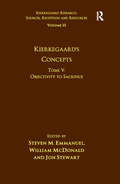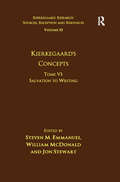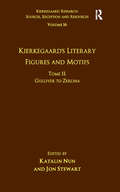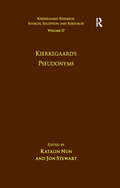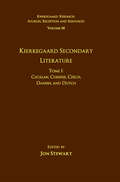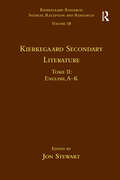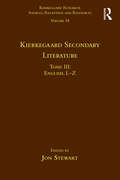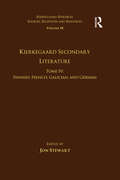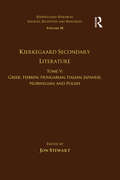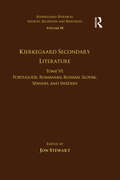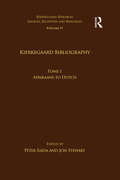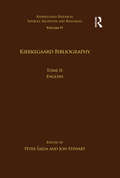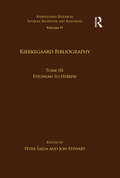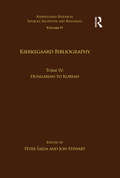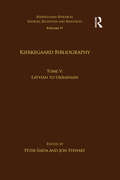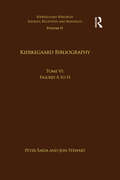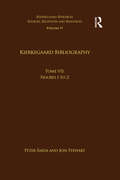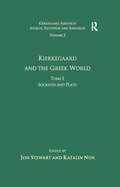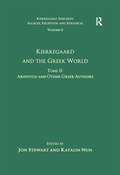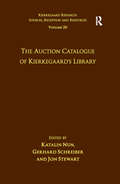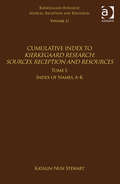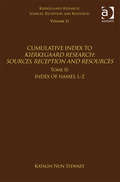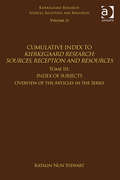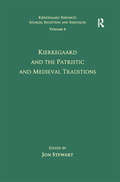- Table View
- List View
Volume 15, Tome V: Objectivity to Sacrifice (Kierkegaard Research: Sources, Reception and Resources)
by Jon Stewart Steven M. Emmanuel William McDonaldKierkegaard’s Concepts is a comprehensive, multi-volume survey of the key concepts and categories that inform Kierkegaard’s writings. Each article is a substantial, original piece of scholarship, which discusses the etymology and lexical meaning of the relevant Danish term, traces the development of the concept over the course of the authorship, and explains how it functions in the wider context of Kierkegaard’s thought. Concepts have been selected on the basis of their importance for Kierkegaard’s contributions to philosophy, theology, the social sciences, literature and aesthetics, thereby making this volume an ideal reference work for students and scholars in a wide range of disciplines.
Volume 15, Tome VI: Salvation to Writing (Kierkegaard Research: Sources, Reception and Resources)
by Jon Stewart Steven M. Emmanuel William McDonaldKierkegaard’s Concepts is a comprehensive, multi-volume survey of the key concepts and categories that inform Kierkegaard’s writings. Each article is a substantial, original piece of scholarship, which discusses the etymology and lexical meaning of the relevant Danish term, traces the development of the concept over the course of the authorship, and explains how it functions in the wider context of Kierkegaard’s thought. Concepts have been selected on the basis of their importance for Kierkegaard’s contributions to philosophy, theology, the social sciences, literature and aesthetics, thereby making this volume an ideal reference work for students and scholars in a wide range of disciplines.
Volume 16, Tome II: Gulliver to Zerlina (Kierkegaard Research: Sources, Reception and Resources)
by Jon Stewart Katalin NunWhile Kierkegaard is perhaps known best as a religious thinker and philosopher, there is an unmistakable literary element in his writings. He often explains complex concepts and ideas by using literary figures and motifs that he could assume his readers would have some familiarity with. This dimension of his thought has served to make his writings far more popular than those of other philosophers and theologians, but at the same time it has made their interpretation more complex. Kierkegaard readers are generally aware of his interest in figures such as Faust or the Wandering Jew, but they rarely have a full appreciation of the vast extent of his use of characters from different literary periods and traditions. The present volume is dedicated to the treatment of the variety of literary figures and motifs used by Kierkegaard. The volume is arranged alphabetically by name, with Tome II covering figures and motifs from Gulliver to Zerlina.
Volume 17: Kierkegaard's Pseudonyms (Kierkegaard Research: Sources, Reception and Resources)
by Jon Stewart Katalin NunOne of the elements that many readers admire in Kierkegaard’s skill as a writer is his ability to create different voices and perspectives in his works. Instead of unilaterally presenting clear-cut doctrines and theses, he confronts the reader with a range of personalities and figures who all espouse different views. One important aspect of this play of perspectives is Kierkegaard’s controversial use of pseudonyms. The present volume is dedicated to exploring the different pseudonyms and authorial voices in Kierkegaard’s writing. The articles featured here try to explore each pseudonymous author as a literary figure and to explain what kind of a person is at issue in each of the pseudonymous works. The hope is that by taking seriously each of these figures as individuals, we will be able to gain new insights into the texts which they are ostensibly responsible for.
Volume 18, Tome I: Catalan, Chinese, Czech, Danish, and Dutch (Kierkegaard Research: Sources, Reception and Resources)
by Jon StewartIn recent years interest in the thought of Kierkegaard has grown dramatically, and with it the body of secondary literature has expanded so quickly that it has become impossible for even the most conscientious scholar to keep pace. The problem of the explosion of secondary literature is made more acute by the fact that much of what is written about Kierkegaard appears in languages that most Kierkegaard scholars do not know. Kierkegaard has become a global phenomenon, and new research traditions have emerged in different languages, countries and regions. The present volume is dedicated to trying to help to resolve these two problems in Kierkegaard studies. Its purpose is, first, to provide book reviews of some of the leading monographic studies in the Kierkegaard secondary literature so as to assist the community of scholars to become familiar with the works that they have not read for themselves. The aim is thus to offer students and scholars of Kierkegaard a comprehensive survey of works that have played a more or less significant role in the research. Second, the present volume also tries to make accessible many works in the Kierkegaard secondary literature that are written in different languages and thus to give a glimpse into various and lesser-known research traditions. The six tomes of the present volume present reviews of works written in Catalan, Chinese, Czech, Danish, Dutch, English, Finnish, French, Galician, German, Greek, Hebrew, Hungarian, Italian, Japanese, Norwegian, Polish, Portuguese, Romanian, Russian, Slovak, Spanish, and Swedish.
Volume 18, Tome II: English, A - K (Kierkegaard Research: Sources, Reception and Resources)
by Jon StewartIn recent years interest in the thought of Kierkegaard has grown dramatically, and with it the body of secondary literature has expanded so quickly that it has become impossible for even the most conscientious scholar to keep pace. The problem of the explosion of secondary literature is made more acute by the fact that much of what is written about Kierkegaard appears in languages that most Kierkegaard scholars do not know. Kierkegaard has become a global phenomenon, and new research traditions have emerged in different languages, countries and regions. The present volume is dedicated to trying to help to resolve these two problems in Kierkegaard studies. Its purpose is, first, to provide book reviews of some of the leading monographic studies in the Kierkegaard secondary literature so as to assist the community of scholars to become familiar with the works that they have not read for themselves. The aim is thus to offer students and scholars of Kierkegaard a comprehensive survey of works that have played a more or less significant role in the research. Second, the present volume also tries to make accessible many works in the Kierkegaard secondary literature that are written in different languages and thus to give a glimpse into various and lesser-known research traditions. The six tomes of the present volume present reviews of works written in Catalan, Chinese, Czech, Danish, Dutch, English, Finnish, French, Galician, German, Greek, Hebrew, Hungarian, Italian, Japanese, Norwegian, Polish, Portuguese, Romanian, Russian, Slovak, Spanish, and Swedish.
Volume 18, Tome III: English L-Z (Kierkegaard Research: Sources, Reception and Resources)
by Jon StewartIn recent years interest in the thought of Kierkegaard has grown dramatically, and with it the body of secondary literature has expanded so quickly that it has become impossible for even the most conscientious scholar to keep pace. The problem of the explosion of secondary literature is made more acute by the fact that much of what is written about Kierkegaard appears in languages that most Kierkegaard scholars do not know. Kierkegaard has become a global phenomenon, and new research traditions have emerged in different languages, countries and regions. The present volume is dedicated to trying to help to resolve these two problems in Kierkegaard studies. Its purpose is, first, to provide book reviews of some of the leading monographic studies in the Kierkegaard secondary literature so as to assist the community of scholars to become familiar with the works that they have not read for themselves. The aim is thus to offer students and scholars of Kierkegaard a comprehensive survey of works that have played a more or less significant role in the research. Second, the present volume also tries to make accessible many works in the Kierkegaard secondary literature that are written in different languages and thus to give a glimpse into various and lesser-known research traditions. The six tomes of the present volume present reviews of works written in Catalan, Chinese, Czech, Danish, Dutch, English, Finnish, French, Galician, German, Greek, Hebrew, Hungarian, Italian, Japanese, Norwegian, Polish, Portuguese, Romanian, Russian, Slovak, Spanish, and Swedish.
Volume 18, Tome IV: Finnish, French, Galician, and German (Kierkegaard Research: Sources, Reception and Resources)
by Jon StewartIn recent years interest in the thought of Kierkegaard has grown dramatically, and with it the body of secondary literature has expanded so quickly that it has become impossible for even the most conscientious scholar to keep pace. The problem of the explosion of secondary literature is made more acute by the fact that much of what is written about Kierkegaard appears in languages that most Kierkegaard scholars do not know. Kierkegaard has become a global phenomenon, and new research traditions have emerged in different languages, countries, and regions. The present volume is dedicated to trying to help to resolve these two problems in Kierkegaard studies. Its purpose is, first, to provide book reviews of some of the leading monographic studies in the Kierkegaard secondary literature so as to assist the community of scholars to become familiar with the works that they have not read for themselves. The aim is thus to offer students and scholars of Kierkegaard a comprehensive survey of works that have played a more or less significant role in the research. Second, the present volume also tries to make accessible many works in the Kierkegaard secondary literature that are written in different languages and thus to give a glimpse into various and lesser-known research traditions. The six tomes of the present volume present reviews of works written in Catalan, Chinese, Czech, Danish, Dutch, English, Finnish, French, Galician, German, Greek, Hebrew, Hungarian, Italian, Japanese, Norwegian, Polish, Portuguese, Romanian, Russian, Slovak, Spanish, and Swedish.
Volume 18, Tome V: Greek, Hebrew, Hungarian, Italian, Japanese, Norwegian, and Polish (Kierkegaard Research: Sources, Reception and Resources)
by Jon StewartIn recent years interest in the thought of Kierkegaard has grown dramatically, and with it the body of secondary literature has expanded so quickly that it has become impossible for even the most conscientious scholar to keep pace. The problem of the explosion of secondary literature is made more acute by the fact that much of what is written about Kierkegaard appears in languages that most Kierkegaard scholars do not know. Kierkegaard has become a global phenomenon, and new research traditions have emerged in different languages, countries, and regions. The present volume is dedicated to trying to help to resolve these two problems in Kierkegaard studies. Its purpose is, first, to provide book reviews of some of the leading monographic studies in the Kierkegaard secondary literature so as to assist the community of scholars to become familiar with the works that they have not read for themselves. The aim is thus to offer students and scholars of Kierkegaard a comprehensive survey of works that have played a more or less significant role in the research. Second, the present volume also tries to make accessible many works in the Kierkegaard secondary literature that are written in different languages and thus to give a glimpse into various and lesser-known research traditions. The six tomes of the present volume present reviews of works written in Catalan, Chinese, Czech, Danish, Dutch, English, Finnish, French, Galician, German, Greek, Hebrew, Hungarian, Italian, Japanese, Norwegian, Polish, Portuguese, Romanian, Russian, Slovak, Spanish, and Swedish.
Volume 18, Tome VI: Portuguese, Romanian, Russian, Slovak, Spanish, and Swedish (Kierkegaard Research: Sources, Reception and Resources)
by Jon StewartIn recent years interest in the thought of Kierkegaard has grown dramatically, and with it the body of secondary literature has expanded so quickly that it has become impossible for even the most conscientious scholar to keep pace. The problem of the explosion of secondary literature is made more acute by the fact that much of what is written about Kierkegaard appears in languages that most Kierkegaard scholars do not know. Kierkegaard has become a global phenomenon, and new research traditions have emerged in different languages, countries, and regions. The present volume is dedicated to trying to help to resolve these two problems in Kierkegaard studies. Its purpose is, first, to provide book reviews of some of the leading monographic studies in the Kierkegaard secondary literature so as to assist the community of scholars to become familiar with the works that they have not read for themselves. The aim is thus to offer students and scholars of Kierkegaard a comprehensive survey of works that have played a more or less significant role in the research. Second, the present volume also tries to make accessible many works in the Kierkegaard secondary literature that are written in different languages and thus to give a glimpse into various and lesser-known research traditions. The six tomes of the present volume present reviews of works written in Catalan, Chinese, Czech, Danish, Dutch, English, Finnish, French, Galician, German, Greek, Hebrew, Hungarian, Italian, Japanese, Norwegian, Polish, Portuguese, Romanian, Russian, Slovak, Spanish, and Swedish.
Volume 19, Tome I: Afrikaans to Dutch (Kierkegaard Research: Sources, Reception and Resources)
by Jon Stewart Peter ŠajdaThe long tradition of Kierkegaard studies has made it impossible for individual scholars to have a complete overview of the vast field of Kierkegaard research. The large and ever increasing number of publications on Kierkegaard in the languages of the world can be simply bewildering even for experienced scholars. The present work constitutes a systematic bibliography which aims to help students and researchers navigate the seemingly endless mass of publications. The volume is divided into two large sections. Part I, which covers Tomes I-V, is dedicated to individual bibliographies organized according to specific language. This includes extensive bibliographies of works on Kierkegaard in some 41 different languages. Part II, which covers Tomes VI-VII, is dedicated to shorter, individual bibliographies organized according to specific figures who are in some way relevant for Kierkegaard. The goal has been to create the most exhaustive bibliography of Kierkegaard literature possible, and thus the bibliography is not limited to any specific time period but instead spans the entire history of Kierkegaard studies.
Volume 19, Tome II: English (Kierkegaard Research: Sources, Reception and Resources)
by Jon Stewart Peter ŠajdaThe long tradition of Kierkegaard studies has made it impossible for individual scholars to have a complete overview of the vast field of Kierkegaard research. The large and ever increasing number of publications on Kierkegaard in the languages of the world can be simply bewildering even for experienced scholars. The present work constitutes a systematic bibliography which aims to help students and researchers navigate the seemingly endless mass of publications. The volume is divided into two large sections. Part I, which covers Tomes I-V, is dedicated to individual bibliographies organized according to specific language. This includes extensive bibliographies of works on Kierkegaard in some 41 different languages. Part II, which covers Tomes VI-VII, is dedicated to shorter, individual bibliographies organized according to specific figures who are in some way relevant for Kierkegaard. The goal has been to create the most exhaustive bibliography of Kierkegaard literature possible, and thus the bibliography is not limited to any specific time period but instead spans the entire history of Kierkegaard studies.
Volume 19, Tome III: Estonian to Hebrew (Kierkegaard Research: Sources, Reception and Resources)
by Jon Stewart Peter ŠajdaThe long tradition of Kierkegaard studies has made it impossible for individual scholars to have a complete overview of the vast field of Kierkegaard research. The large and ever increasing number of publications on Kierkegaard in the languages of the world can be simply bewildering even for experienced scholars. The present work constitutes a systematic bibliography which aims to help students and researchers navigate the seemingly endless mass of publications. The volume is divided into two large sections. Part I, which covers Tomes I-V, is dedicated to individual bibliographies organized according to specific language. This includes extensive bibliographies of works on Kierkegaard in some 41 different languages. Part II, which covers Tomes VI-VII, is dedicated to shorter, individual bibliographies organized according to specific figures who are in some way relevant for Kierkegaard. The goal has been to create the most exhaustive bibliography of Kierkegaard literature possible, and thus the bibliography is not limited to any specific time period but instead spans the entire history of Kierkegaard studies.
Volume 19, Tome IV: Hungarian to Korean (Kierkegaard Research: Sources, Reception and Resources)
by Jon Stewart Peter ŠajdaThe long tradition of Kierkegaard studies has made it impossible for individual scholars to have a complete overview of the vast field of Kierkegaard research. The large and ever increasing number of publications on Kierkegaard in the languages of the world can be simply bewildering even for experienced scholars. The present work constitutes a systematic bibliography which aims to help students and researchers navigate the seemingly endless mass of publications. The volume is divided into two large sections. Part I, which covers Tomes I-V, is dedicated to individual bibliographies organized according to specific language. This includes extensive bibliographies of works on Kierkegaard in some 41 different languages. Part II, which covers Tomes VI-VII, is dedicated to shorter, individual bibliographies organized according to specific figures who are in some way relevant for Kierkegaard. The goal has been to create the most exhaustive bibliography of Kierkegaard literature possible, and thus the bibliography is not limited to any specific time period but instead spans the entire history of Kierkegaard studies.
Volume 19, Tome V: Latvian to Ukrainian (Kierkegaard Research: Sources, Reception and Resources)
by Jon Stewart Peter ŠajdaThe long tradition of Kierkegaard studies has made it impossible for individual scholars to have a complete overview of the vast field of Kierkegaard research. The large and ever increasing number of publications on Kierkegaard in the languages of the world can be simply bewildering even for experienced scholars. The present work constitutes a systematic bibliography which aims to help students and researchers navigate the seemingly endless mass of publications. The volume is divided into two large sections. Part I, which covers Tomes I-V, is dedicated to individual bibliographies organized according to specific language. This includes extensive bibliographies of works on Kierkegaard in some 41 different languages. Part II, which covers Tomes VI-VII, is dedicated to shorter, individual bibliographies organized according to specific figures who are in some way relevant for Kierkegaard. The goal has been to create the most exhaustive bibliography of Kierkegaard literature possible, and thus the bibliography is not limited to any specific time period but instead spans the entire history of Kierkegaard studies.
Volume 19, Tome VI: Figures A to H (Kierkegaard Research: Sources, Reception and Resources)
by Jon Stewart Peter ŠajdaThe long tradition of Kierkegaard studies has made it impossible for individual scholars to have a complete overview of the vast field of Kierkegaard research. The large and ever increasing number of publications on Kierkegaard in the languages of the world can be simply bewildering even for experienced scholars. The present work constitutes a systematic bibliography which aims to help students and researchers navigate the seemingly endless mass of publications. The volume is divided into two large sections. Part I, which covers Tomes I-V, is dedicated to individual bibliographies organized according to specific language. This includes extensive bibliographies of works on Kierkegaard in some 41 different languages. Part II, which covers Tomes VI-VII, is dedicated to shorter, individual bibliographies organized according to specific figures who are in some way relevant for Kierkegaard. The goal has been to create the most exhaustive bibliography of Kierkegaard literature possible, and thus the bibliography is not limited to any specific time period but instead spans the entire history of Kierkegaard studies.
Volume 19, Tome VII: Figures I to Z (Kierkegaard Research: Sources, Reception and Resources)
by Jon Stewart Peter ŠajdaThe long tradition of Kierkegaard studies has made it impossible for individual scholars to have a complete overview of the vast field of Kierkegaard research. The large and ever increasing number of publications on Kierkegaard in the languages of the world can be simply bewildering even for experienced scholars. The present work constitutes a systematic bibliography which aims to help students and researchers navigate the seemingly endless mass of publications. The volume is divided into two large sections. Part I, which covers Tomes I-V, is dedicated to individual bibliographies organized according to specific language. This includes extensive bibliographies of works on Kierkegaard in some 41 different languages. Part II, which covers Tomes VI-VII, is dedicated to shorter, individual bibliographies organized according to specific figures who are in some way relevant for Kierkegaard. The goal has been to create the most exhaustive bibliography of Kierkegaard literature possible, and thus the bibliography is not limited to any specific time period but instead spans the entire history of Kierkegaard studies.
Volume 2, Tome I: Socrates And Plato (Kierkegaard Research: Sources, Reception and Resources)
by Katalin NunThe articles in this volume employ source-work research to trace Kierkegaard's understanding and use of authors from the Greek tradition. A series of figures of varying importance in Kierkegaard's authorship are treated, ranging from early Greek poets to late Classical philosophical schools. In general it can be said that the Greeks collectively constitute one of the single most important body of sources for Kierkegaard's thought. He studied Greek from an early age and was profoundly inspired by what might be called the Greek spirit. Although he is generally considered a Christian thinker, he was nonetheless consistently drawn back to the Greeks for ideas and impulses on any number of topics. He frequently contrasts ancient Greek philosophy, with its emphasis on the lived experience of the individual in daily life, with the abstract German philosophy that was in vogue during his own time. It has been argued that he modeled his work on that of the ancient Greek thinkers specifically in order to contrast his own activity with that of his contemporaries.
Volume 2, Tome II: Socrates And Plato (Kierkegaard Research: Sources, Reception and Resources)
by Katalin NunThe articles in this volume employ source-work research to trace Kierkegaard's understanding and use of authors from the Greek tradition. A series of figures of varying importance in Kierkegaard's authorship are treated, ranging from early Greek poets to late Classical philosophical schools. In general it can be said that the Greeks collectively constitute one of the single most important body of sources for Kierkegaard's thought. He studied Greek from an early age and was profoundly inspired by what might be called the Greek spirit. Although he is generally considered a Christian thinker, he was nonetheless consistently drawn back to the Greeks for ideas and impulses on any number of topics. He frequently contrasts ancient Greek philosophy, with its emphasis on the lived experience of the individual in daily life, with the abstract German philosophy that was in vogue during his own time. It has been argued that he modeled his work on that of the ancient Greek thinkers specifically in order to contrast his own activity with that of his contemporaries.
Volume 20: The Auction Catalogue of Kierkegaard's Library (Kierkegaard Research: Sources, Reception and Resources)
by Katalin Nun Gerhard SchreiberThis volume is a revised and improved edition of the auction catalogue of Kierkegaard’s private library. The catalogue has long served as one of the most valuable tools in Kierkegaard studies and has been actively used by commentators, translators and researchers for tracing the various sources of Kierkegaard’s thought. With the catalogue in hand, one can determine with some degree of probability what books he read and what editions he used for his information about specific authors. The present volume represents the fourth printing of the catalogue, and it differs from its predecessors in many respects. The previous editions contained incomplete, erroneous and inconsistent bibliographical information about the works in the catalogue. The primary goal of the present edition was to obtain all of the books and check their title pages for the precise bibliographical information. The result is an accurate and reliable edition of the catalogue that conforms to the needs of Kierkegaard studies in the digital age.
Volume 21, Tome I: Index of Names, A-K (Kierkegaard Research: Sources, Reception and Resources)
by Katalin Nun StewartThis last volume of Kierkegaard Research: Sources, Reception and Resources is a cumulative index to all the volumes of the series. The series was originally designed in a systematic fashion in order to make it as easily usable and accessible as possible. The individual parts of the series and the individual volumes have been organized to make it generally fairly simple to locate the main articles relevant for one’s research interests. However, the placement of some individual articles might not always be completely self-evident. Moreover, the sheer mass of material and information provided by the series makes a cumulative index a necessary accompanying resource. Further, given the scope of the series, it was inevitable that some names or topics are mentioned more than once in the series in different places beyond the main article ostensibly dedicated to them. The purpose of these indices is thus to help the readers to find an easy and direct way to the topics of their interest in the rich universe of Kierkegaard research. The material of the indices is divided into three tomes: Tome I is the Index of Names from A to K, Tome II covers the Index of Names from L to Z, while Tome III consists of the Index of Subjects and includes a complete overview of all the volumes, tomes and articles of the series.
Volume 21, Tome II: Index of Names, L-Z (Kierkegaard Research: Sources, Reception and Resources)
by Katalin Nun StewartThis last volume of Kierkegaard Research: Sources, Reception and Resources is a cumulative index to all the volumes of the series. The series was originally designed in a systematic fashion in order to make it as easily usable and accessible as possible. The individual parts of the series and the individual volumes have been organized to make it generally fairly simple to locate the main articles relevant for one’s research interests. However, the placement of some individual articles might not always be completely self-evident. Moreover, the sheer mass of material and information provided by the series makes a cumulative index a necessary accompanying resource. Further, given the scope of the series, it was inevitable that some names or topics are mentioned more than once in the series in different places beyond the main article ostensibly dedicated to them. The purpose of these indices is thus to help the readers to find an easy and direct way to the topics of their interest in the rich universe of Kierkegaard research. The material of the indices is divided into three tomes: Tome I is the Index of Names from A to K, Tome II covers the Index of Names from L to Z, while Tome III consists of the Index of Subjects and includes a complete overview of all the volumes, tomes and articles of the series.
Volume 21, Tome III: Index of Subjects, Overview of the Articles in the Series (Kierkegaard Research: Sources, Reception and Resources)
by Katalin Nun StewartThis last volume of Kierkegaard Research: Sources, Reception and Resources is a cumulative index to all the volumes of the series. The series was originally designed in a systematic fashion in order to make it as easily usable and accessible as possible. The individual parts of the series and the individual volumes have been organized to make it generally fairly simple to locate the main articles relevant for one’s research interests. However, the placement of some individual articles might not always be completely self-evident. Moreover, the sheer mass of material and information provided by the series makes a cumulative index a necessary accompanying resource. Further, given the scope of the series, it was inevitable that some names or topics are mentioned more than once in the series in different places beyond the main article ostensibly dedicated to them. The purpose of these indices is thus to help the readers to find an easy and direct way to the topics of their interest in the rich universe of Kierkegaard research. The material of the indices is divided into three tomes: Tome I is the Index of Names from A to K, Tome II covers the Index of Names from L to Z, while Tome III consists of the Index of Subjects and includes a complete overview of all the volumes, tomes and articles of the series.
Volume 3: Kierkegaard and the Roman World (Kierkegaard Research: Sources, Reception and Resources #Vol. 3)
by Jon StewartWhile Kierkegaard's use of the Greek authors, particularly Plato and Aristotle, has attracted considerable attention over the years, his use of the Roman authors has, by contrast, remained sadly neglected. This neglect is somewhat surprising given the fact that Kierkegaard was extremely well read in Latin from his early youth when he attended the Borgerdyd School in Copenhagen. Kierkegaard's interest in the Roman authors is perhaps best evidenced by his book collection. In his private library he had a long list of Latin titles and Danish translations of the standard Roman authors in any number of different genres. His extensive and frequent use of writers such as Cicero, Horace, Terence, Seneca, Suetonius and Ovid clearly warrants placing them in the select group of his major sources. The chapters in this volume demonstrate that Kierkegaard made use of the Roman sources in a number of different ways. His readings from the Borgerdyd school seem to have stuck with him as an adult. He constantly refers to Roman authors, such as Livy, Nepos, and Suetonius for colourful stories and anecdotes. In addition, he avails himself of pregnant sayings or formulations from the Roman authors, when appropriate. But his use of these authors is not merely as a rhetorical source. He is also profoundly interested in the Roman philosophy of Cicero, Seneca and Marcus Aurelius. Similarly, just as he is fascinated by Tacitus' portrayal of the early Christians, so also he is amused by the humour of Terence and Apuleius. In short, the Roman authors serve to enrich any number of different aspects of Kierkegaard's authorship with respect to both content and form.
Volume 4: Kierkegaard and the Patristic and Medieval Traditions (Kierkegaard Research: Sources, Reception and Resources)
by Jon StewartThis volume features articles which employ source-work research to trace Kierkegaard's understanding and use of authors from the Patristic and Medieval traditions. It covers an extraordinarily long period of time from Cyprian and Tertullian in the second century to Thomas à Kempis in the fifteenth. Despite its heterogeneity and diversity in many aspects, this volume has a clear point of commonality in all its featured sources: Christianity. Kierkegaard's relation to the Patristic and Medieval traditions has been a rather neglected area of research in Kierkegaard studies. This is somewhat surprising given the fact that the young Kierkegaard learned about the Patristic authors during his studies at the University of Copenhagen and was clearly fascinated by many aspects of their writings and the conceptions of Christian religiosity found there. With regard to the medieval tradition, in addition to any number of theological issues, medieval mysticism, medieval art, the medieval church, troubadour poetry and the monastic movement were all themes that exercised Kierkegaard during different periods of his life. Although far from uncritical, he seems at times to idolize both the Patristic tradition and the Middle Ages as contrastive terms to the corrupt and decadent modern world with its complacent Christianity. While he clearly regards the specific forms of this Medieval appropriation of Christianity to be misguided, he is nonetheless positively disposed toward the general understanding of it as something to be lived and realized by each individual.
